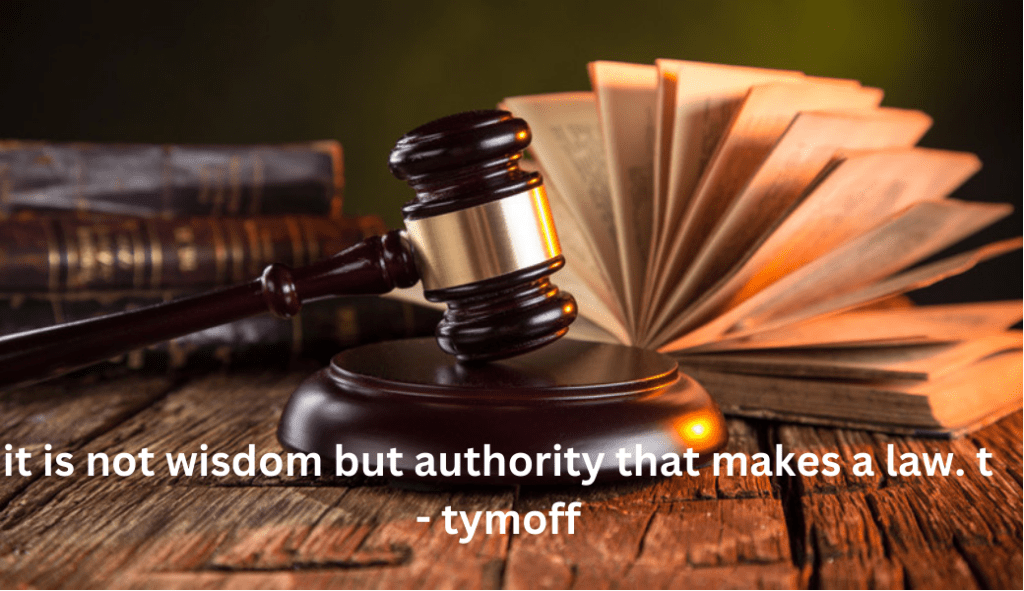Every civilized society’s cornerstone, the law, has been moulded by a variety of beliefs and ideologies. The idea that “it is not wisdom but authority that makes a law” stands out among the rest. According to this notion, a law’s legitimacy derives not only from its inherent worth or logical soundness but also from the authority that oversaw its construction. We shall examine this maxim in depth in this extensive post, looking at its historical background, the impact it has on legal systems, and the complex relationship between authority and lawmaking.
A law is made by authority, not by wisdom.
The idea that the authority of a law’s source is not necessarily its wisdom, but rather the authority vested in those who make and implement it, is at the core of all legal systems. This idea, which is frequently credited to Thomas Tyndall, emphasizes the fact that a law’s legitimacy is not solely based on its intellectual profundity or moral uprightness. Instead, it depends on a genuine governing body or authority’s approval and recognition.
The Historical Background
We need to go back in time to learn more about this principle’s first use. Early governments and governing bodies had the authority to enact laws without the necessity for lengthy reasons. Because of the power granted to the rulers, these rules were accepted and upheld by the populace. The assumption that power and the law are inextricably linked was founded on this historical precedence.
Consequences for Legal Systems
For legal systems around the world, the adage “it is not wisdom but authority that makes a law” has significant ramifications. It means that laws, regardless of how illogical or unfair they may seem to some, are nevertheless regarded as legal as long as they are upheld by an authorized body. This idea calls into question how to strike a balance between the necessity for strong leadership and the pursuit of justice.
The idea has resulted in the development of legal systems where the authority of governing entities is given priority above the moral or ethical foundations of laws in many nations. This can occasionally lead to the execution of laws that are seen as unfair by a certain part of the populace.
Credibility and Authenticity
This notion is based on the connection between legitimacy and authority. A law needs to be accepted by the governed in order to be effective. The legitimacy of the entity or person who created the law is intimately related to their authority. This dynamic underlines how crucial it is for laws to be complied with and accepted by the general people in order to be successfully implemented.
Lawmaking and the Role of Authority
The idea of authority goes beyond the simple passing of laws; it is crucial in determining how a society’s entire legal system is shaped. Legal systems get legitimacy and stability from the authority that supports their legislative bodies. When people believe the authority enforcing the law is legitimate and competent, they are more inclined to obey it.
FAQs
Is it possible for a law to be just even if it lacks wisdom?
A: In accordance with this idea, a law’s justice does not depend exclusively on its wisdom. Even though a law’s intrinsic wisdom is debatable, it can still be considered just if it is upheld by a legal authority.
How has this idea affected the development of legal systems?
This idea can have an impact on how legal systems develop by elevating governing bodies’ authority above the requirement for ongoing philosophical defenses of the laws.
How much weight can a law have if it is based on wisdom but lacks authority?
A law, no matter how wise, may struggle to be upheld without the support of a legitimate authority.
Does this rule apply to all legal systems equally?
The principle is historical and universally applicable, but different legal systems have varied methods of interpreting and applying it depending on cultural, political, and social variables.
How is the pursuit of justice reconciled with this ideal in contemporary society?
A: The upholding of authoritative governance and providing justice for all members of society are two issues that modern legal discourse frequently struggles with balancing.
A legal system can be sustained by authority alone, but not by wisdom.
A legal system that lacks intelligence and fairness may eventually confront challenges to its legitimacy and efficacy, even though authority is important.
Conclusion
The adage “It is not wisdom but authority that makes a law” captures the fundamental character of legal systems. This idea serves as a helpful reminder that laws’ validity and enforceability depend not only on their intrinsic wisdom or justice, but also on the power bestowed upon those who enact and uphold them. Although this idea has influenced legal systems throughout history, its implications are still important in the modern world. Understanding this idea helps us better grasp how authority, legitimacy, and justice must coexist within legal systems.



